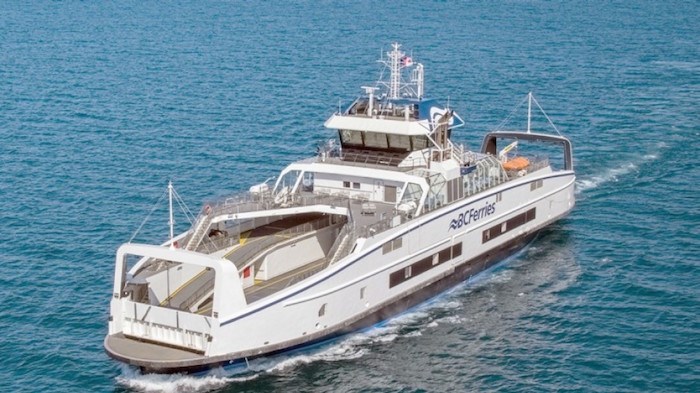 Island Class hybrid electric ferry conducting sea trials. Photo courtesy BC Ferries
Island Class hybrid electric ferry conducting sea trials. Photo courtesy BC Ferries
Damen Shipyards Group of the Netherlands has won a contract to build four more electric-hybrid ferries for BC Ferries that will be identical to two vessels that Damen just completed for the ferry corporation.
Project cost for the four latest Island-class vessels is about $200 million, including financing and project-management.
No Canadian shipyards bid on the contract, BC Ferries said. However, Point Hope Maritime, on Harbour Road in Victoria, will deliver technical and warranty support under a long-term service contract for all six Island-class ferries once they arrive.
Sea trials have been completed for the first two vessels and B.C. Ferries has accepted provisional delivery, said Capt. Jamie Marshall, BC Ferries vice-president of business development and innovation.
Next week, they are expected to be loaded into another vessel for the 40- to 45-day voyage to Canada.
“We anticipate getting them in time for Christmas or shortly thereafter,” Marshall said.
The first Island-class vessels are scheduled to come into service mid-2020 on the Powell River-Texada Island route and the Port McNeill-Alert Bay-Sointula Island route. A naming ceremony will be held early in 2020.
The other four vessels are to be delivered in 2022. They will serve the Campbell River-Quadra Island route and the Nanaimo Harbour-Gabriola Island route.
For the two latter routes, one older ferry is being replaced by two smaller ones. BC Ferries said the result will be more frequent service, more passenger capacity per hour and reduced lineups for vehicles.
Each ferry will be able to carry at least 47 vehicles and between 300 and 450 passengers and crew, depending on the crew numbers and amount of life-saving equipment stipulated by Transport Canada.
BC Ferries’ 12-year plan calls for up to a dozen 265-foot-long Island-class vessels, Marshall said Wednesday. No dates have been set to order more Island-class ships.
Passengers should experience a quieter ride, Marshall said. “These are the latest techology. They will be ultra-quiet.”
The four-vessel agreement is a design-build, fixed-price contract and features “guarantees related to delivery dates, performance criteria, cost certainty and quality construction,” BC Ferries said in a statement.
BC Ferries is moving to reduce its environmental footprint, cutting greenhouse-gas emissions by using clean and renewable energy.
“These next four Island-class ships are a major step in our plan to progressively lower emissions across the fleet and be a leader in the energy transition to a lower-carbon future,” Marshall said. “We feel in Canada we are being leaders in this area.”
BC Ferries is in discussions with BC Hydro about what is needed for on-shore electric charging technology and shared costs, Marshall said. Once that is in place, the ships will operate on an all-electric system with batteries.
Deborah Marshall, BC Ferries spokeswoman, said it could take several years to set up land-based charging systems.
Meanwhile, Island-class ferries will use an on-board, low-sulphur diesel hybrid system.
Along with electric power and propulsion systems, twin propellers will cut down on underwater noise. Machinery is being set up to reduce noise on board and underwater. Noise-reduction strategies are aimed at reducing disturbance to killer whales.
Other features include solariums and passenger lounges, and making the vessels more accessible to people with mobility issues.
Damen is headquartered in the Netherlands and has operations around the globe. It built the first two Island- class ferries in Romania, where the next four are also set to be constructed, Jamie Marshall said. The Galati yard in Romania is one of Damen’s largest, the company says on its website.



